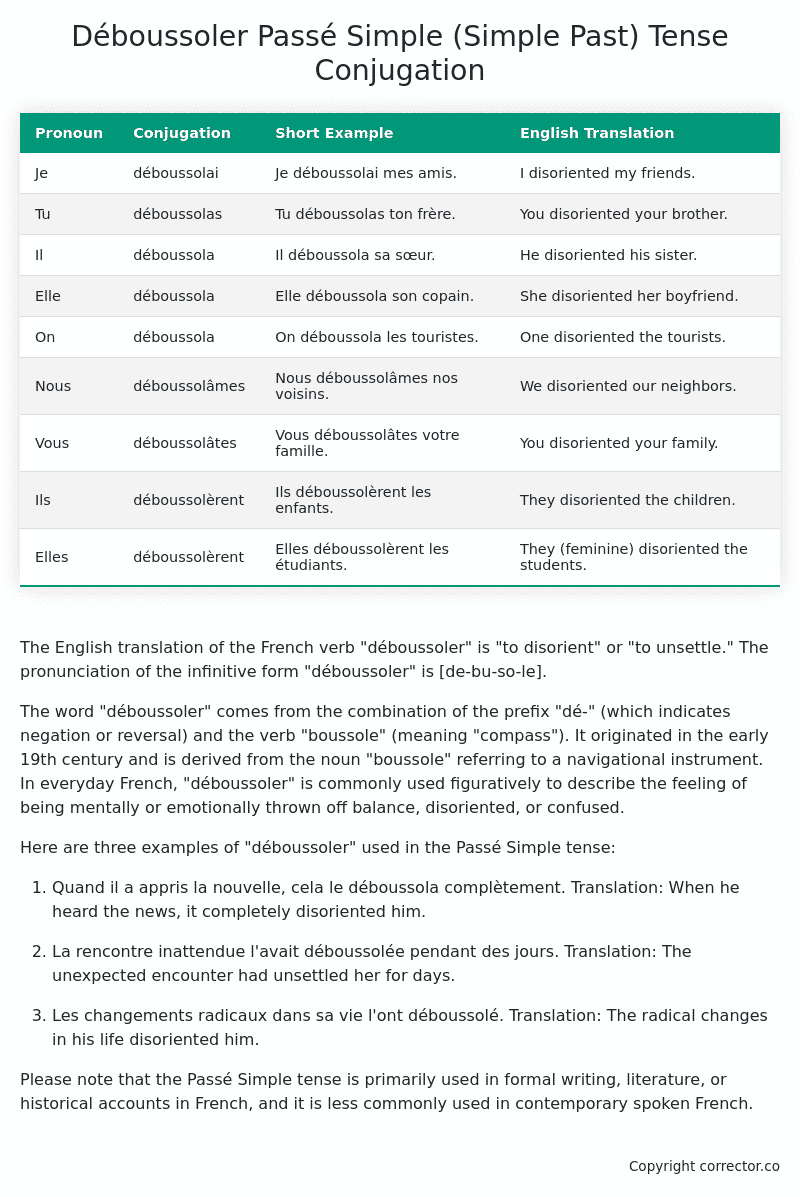Passé Simple (Simple Past) Tense Conjugation of the French Verb déboussoler
Introduction to the verb déboussoler
The English translation of the French verb “déboussoler” is “to disorient” or “to unsettle.” The pronunciation of the infinitive form “déboussoler” is [de-bu-so-le].
The word “déboussoler” comes from the combination of the prefix “dé-” (which indicates negation or reversal) and the verb “boussole” (meaning “compass”). It originated in the early 19th century and is derived from the noun “boussole” referring to a navigational instrument. In everyday French, “déboussoler” is commonly used figuratively to describe the feeling of being mentally or emotionally thrown off balance, disoriented, or confused.
Here are three examples of “déboussoler” used in the Passé Simple tense:
-
Quand il a appris la nouvelle, cela le déboussola complètement.
Translation: When he heard the news, it completely disoriented him. -
La rencontre inattendue l’avait déboussolée pendant des jours.
Translation: The unexpected encounter had unsettled her for days. -
Les changements radicaux dans sa vie l’ont déboussolé.
Translation: The radical changes in his life disoriented him.
Please note that the Passé Simple tense is primarily used in formal writing, literature, or historical accounts in French, and it is less commonly used in contemporary spoken French.
Table of the Passé Simple (Simple Past) Tense Conjugation of déboussoler
| Pronoun | Conjugation | Short Example | English Translation |
|---|---|---|---|
| Je | déboussolai | Je déboussolai mes amis. | I disoriented my friends. |
| Tu | déboussolas | Tu déboussolas ton frère. | You disoriented your brother. |
| Il | déboussola | Il déboussola sa sœur. | He disoriented his sister. |
| Elle | déboussola | Elle déboussola son copain. | She disoriented her boyfriend. |
| On | déboussola | On déboussola les touristes. | One disoriented the tourists. |
| Nous | déboussolâmes | Nous déboussolâmes nos voisins. | We disoriented our neighbors. |
| Vous | déboussolâtes | Vous déboussolâtes votre famille. | You disoriented your family. |
| Ils | déboussolèrent | Ils déboussolèrent les enfants. | They disoriented the children. |
| Elles | déboussolèrent | Elles déboussolèrent les étudiants. | They (feminine) disoriented the students. |
Other Conjugations for Déboussoler.
Le Present (Present Tense) Conjugation of the French Verb déboussoler
Imparfait (Imperfect) Tense Conjugation of the French Verb déboussoler
Passé Simple (Simple Past) Tense Conjugation of the French Verb déboussoler (You’re reading it right now!)
Passé Composé (Present Perfect) Tense Conjugation of the French Verb déboussoler
Futur Simple (Simple Future) Tense Conjugation of the French Verb déboussoler
Futur Proche (Near Future) Tense Conjugation of the French Verb déboussoler
Plus-que-parfait (Pluperfect) Tense Conjugation of the French Verb déboussoler
Passé Antérieur (Past Anterior) Tense Conjugation of the French Verb déboussoler
Futur Antérieur (Future Anterior) Tense Conjugation of the French Verb déboussoler
Subjonctif Présent (Subjunctive Present) Tense Conjugation of the French Verb déboussoler
Subjonctif Passé (Subjunctive Past) Tense Conjugation of the French Verb déboussoler
Subjonctif Imparfait (Subjunctive Imperfect) Tense Conjugation of the French Verb déboussoler
Conditionnel Présent (Conditional Present) Tense Conjugation of the French Verb déboussoler
Conditionnel Passé (Conditional Past) Tense Conjugation of the French Verb déboussoler
Conditionnel Passé II (Conditional Past II) Tense Conjugation of the French Verb déboussoler
L’impératif Présent (Imperative Present) Tense Conjugation of the French Verb déboussoler
L’impératif Passé (Imperative Past) Tense Conjugation of the French Verb déboussoler
L’infinitif Présent (Infinitive Present) Tense Conjugation of the French Verb déboussoler
L’infinitif Passé (Infinitive Past) Tense Conjugation of the French Verb déboussoler
Le Participe Présent (Present Participle) Tense Conjugation of the French Verb déboussoler
Le Participe Passé (Past Participle) Tense Conjugation of the French Verb déboussoler
Struggling with French verbs or the language in general? Why not use our free French Grammar Checker – no registration required!
Get a FREE Download Study Sheet of this Conjugation 🔥
Simply right click the image below, click “save image” and get your free reference for the déboussoler Passé Simple tense conjugation!

Déboussoler – About the French Passé Simple (Simple Past) Tense
Formation
Usage
Narration
Historical Context
Interactions with other tenses
Passé Composé
Imparfait
Conditional and Subjunctive
Summary
I hope you enjoyed this article on the verb déboussoler. Still in a learning mood? Check out another TOTALLY random French verb conjugation!


